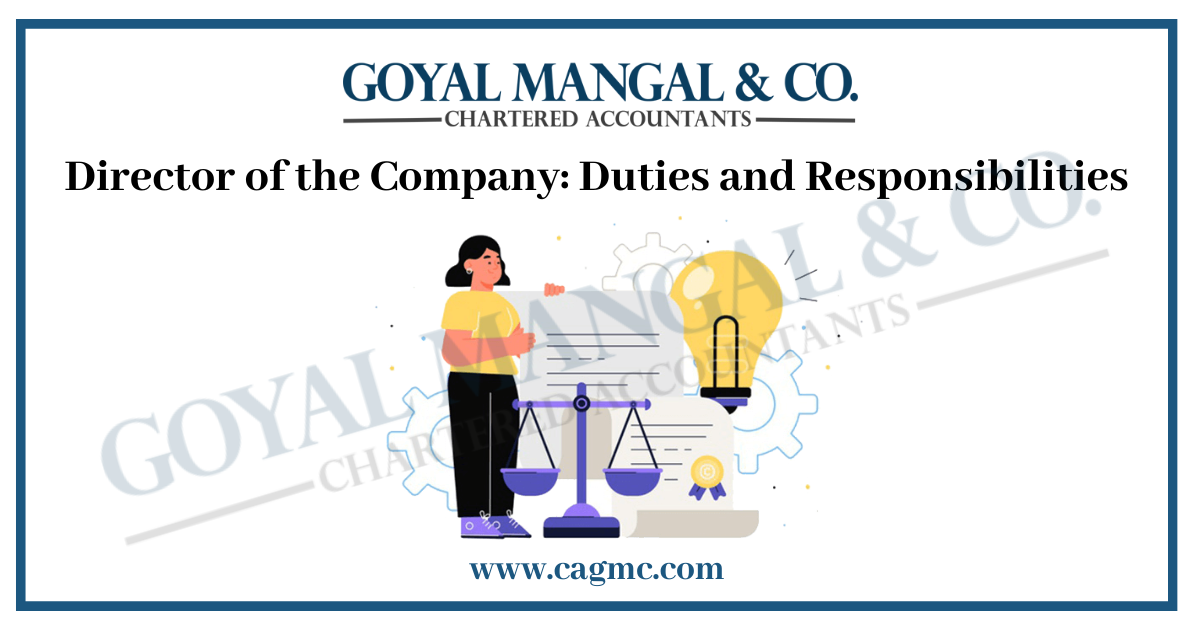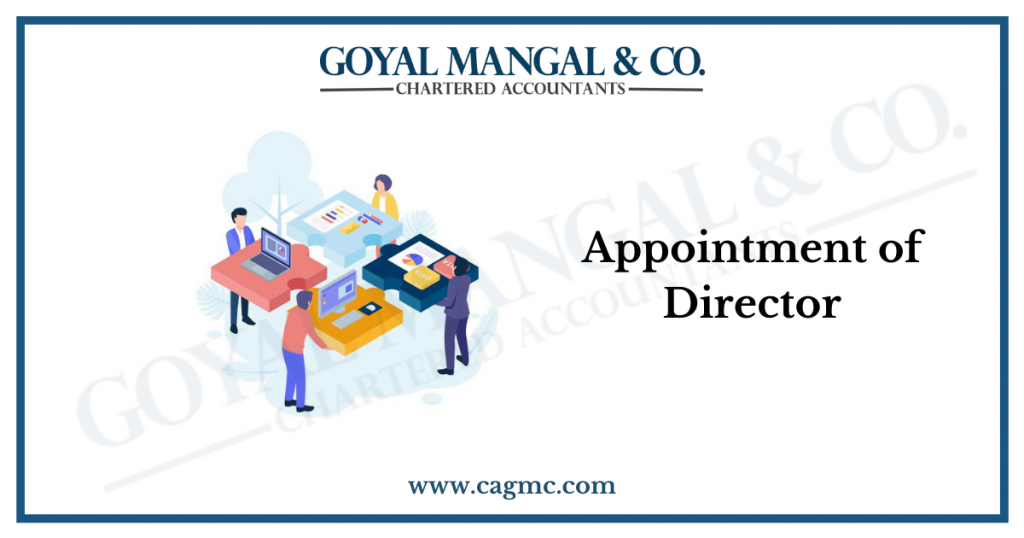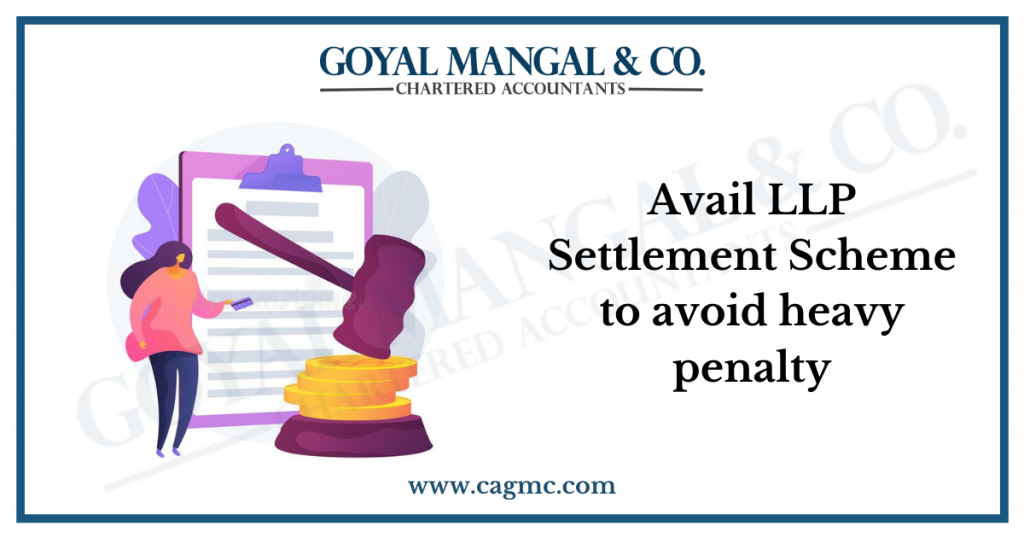
Duties and Responsibilities of director’s role holds significant importance in the business. A company’s director is more of a title; its position signifies leadership, accountability, and decision-making. In this article, we explore the fundamental responsibilities and duties of a director of a company. Along with the essential contributions they make by guiding the companies, which lead to success. From strategic planning to ethical governance, let’s explore the role of a director within a company’s structure.
Table of Contents
What do you mean by director of the company?
A director of a company is an individual who holds authority and several responsibilities within the organisation’s governance structure. Directors are the part of an organisation’s board of directors that is a group of persons together responsible for taking high-level decisions and giving oversight to ensure the success of the organisation along with its legal compliance.
Directors are appointed based on their skills, experience, and expertise as per the company’s operations. They are responsible for taking all critical decisions that affect an organisation’s overall direction, long-term goals, and financial health.
They represent the interests of an organisation’s shareholders or stakeholders. As they provide strategic guidance to an organisation’s management team. The role of a director is multifaceted and involves a range of duties and responsibilities aimed at ensuring the company’s growth, sustainability, and ethical conduct.
Significant skills are required for the company’s director.
Here are some of the significant skills of the company directors Duties and Responsibilities:
- Strategic Thinking: Directors must be able to think long-term and provide strategic guidance to the company. They should understand market trends, competition, and the broader industry landscape to help the company navigate challenges and seize opportunities.
- Leadership: Strong leadership skills are essential for setting the company’s vision, guiding its mission, and motivating both the board and the management team towards shared goals.
- Decision-Making: Directors are often faced with complex and impactful decisions. Directors require the capability to analyse the information, benefits, and risks and create well-informed decisions that align with an organisation’s best interests.
- Financial Acumen: Understanding financial statements, budgets, and key financial indicators is crucial for effective oversight of the company’s financial health and performance.
- Industry Knowledge: Directors should have a good grasp of the company’s industry, trends, and competitive landscape. This knowledge helps them provide relevant insights and make informed decisions.
- Ethical and Legal Awareness: Directors must ensure the company operates ethically and within legal boundaries. Familiarity with corporate governance principles and compliance requirements is essential.
- Communication Skills: Directors need to effectively communicate with a diverse group of stakeholders, including fellow directors, management, shareholders, and regulatory bodies. Clear and transparent communication is vital.
- Problem-Solving: Companies encounter various challenges. Directors must have problem-solving skills to address problems that may arise and identify innovative solutions.
- Risk Management: The main roles of the directors are managing, identifying, and assessing risks. They should be able to balance risk and provide the best solution in favour of an organisation’s interests.
- Conflict Resolution: Directors need to navigate disagreements and conflicts that may arise during board discussions. Being able to facilitate constructive conversations and find common ground is important.
- Adaptability: Industries and markets are constantly evolving. Directors should be adaptable and open to new ideas and approaches to help the company stay relevant and competitive.
- Strategic Networking: Developing and maintaining a network of industry contacts can provide valuable insights, potential partnerships, and opportunities for the company.
- Objectivity: Directors, especially non-executive and independent directors, need to maintain an objective perspective and make decisions that prioritise the company’s overall interests over personal or external agendas.
- Crisis Management: During tough times or uncertain events, directors should be able to take the lead and help an organisation through challenging situations.
Duties and Responsibilities of a Director of the Company
Here are some key roles and responsibilities of directors companies act 2013:
- Fiduciary Duty: Directors have a legal obligation to act in the best interests of the company and its shareholders. This duty requires them to prioritise the company’s welfare over personal interests or external influences.
- Strategic Planning: Directors are making the company’s long-term strategy. As they involve making decisions, setting strategic goals, and evaluating business opportunities. These are aligned with an organisation’s vision and mission.
- Decision-Making: Directors are responsible for making informed and ethical decisions that affect the company’s operations, financial health, and overall direction. They must analyse the available information and consider the potential impacts of their choices.
- Risk Management: Identifying and managing risks is essential. Directors must assess potential risks, develop strategies to mitigate them, and monitor the effectiveness of risk management practices.
- Financial Oversight: Directors review and approve financial statements, budgets, and major financial decisions. They ensure the company maintains accurate financial records and operates within its financial capabilities.
- Ethical Standards: Upholding ethical behaviour within the company is a director’s responsibility. They have to make sure that the company performs with transparency, integrity, and compliance with ethical instructions.
- Stakeholder Engagement: Directors engage with various stakeholders, including employees, customers, suppliers, and shareholders. They maintain open communication channels and address concerns from these groups.
- Succession Planning: Directors often participate in identifying and developing potential successors for key leadership positions within the company, including the CEO and other top executives.
- Compliance: Directors ensure the company adheres to relevant laws, regulations, and industry standards. They oversee legal compliance efforts and may appoint committees to monitor specific compliance areas.
- Crisis Management: Directors are instrumental in managing crises that may affect the company’s reputation, operations, or financial stability. They help devise strategies to navigate through challenges.
- Shareholder Relations: Directors communicate with shareholders about the company’s performance, financial results, and strategic direction during annual general meetings and other interactions.
- Monitoring Management: Directors monitor the performance of the company’s senior management team, providing guidance and holding them accountable for achieving corporate goals.
- Innovation and Adaptation: Directors encourage innovation and adaptation to changing market conditions. They contribute fresh perspectives and challenge established norms when needed.
- Environmental and Social Responsibility: Directors oversee the company’s efforts to fulfil its environmental and social responsibilities, aligning with sustainable business practices.
Liabilities of a Director of the Company
Here are some key liabilities that directors of the company may face:
- Fiduciary Duty: Directors have a fiduciary duty to act in the best interests of the company and its shareholders. Failure to uphold this duty could result in legal action against directors if their actions are deemed to prioritise personal gain or other interests over the company’s welfare.
- Breach of Duty of Care: It is expected of the directors to take decisions with a reasonable level of skill, care, and diligence. If the director fails to perform this, it will lead to financial losses or harm for the organisation.
- Conflict of Interest: Directors must avoid situations where their interests conflict with those of the company. If the director fails to disclose conflicts of interest or to perform in an organisation’s best interest. When such conflicts arise, they may lead to legal action and liability.
- Mismanagement and Negligence: In cases where directors take decisions that lead to financial losses, mismanagement of an organisation’s affairs, and harm to stakeholders, Then they will be liable for the consequences.
- Environmental and Regulatory Compliance: Directors must make sure that an organisation complies with regulatory laws and environmental regulations. Failure to do so can result in fines, legal action, and personal liability.
- Health and Safety Obligations: Directors are taking appropriate measures to ensure the health and safety of employees, other shareholders, and consumers. Failure to fulfil these duties may lead to legal consequences.
- Fraud and misrepresentation: Directors may be held liable if they are involved in fraudulent activities or if they provide false or misleading information about the company’s financial situation or prospects.
- Personal Liability for Company Debts: In certain circumstances, directors can be held personally liable for company debts, particularly in cases where they have given personal guarantees for loans or have engaged in wrongful trading.
- Breaches of Statutory Duties: Directors have duties outlined in company law, such as ensuring accurate financial reporting, maintaining proper records, and holding annual general meetings. Breaching these statutory duties can lead to legal action and penalties.
Takeaway
As we draw your kind attention to our exploration, a director’s role is not confined to the boardrooms. It extends into strategic decision-making, risk management, and maintaining the company’s values. The directors have emerged as guardian angels in times of challenge. As we look into the future, the role of a director will continue to adapt to the changing landscapes of commerce, society, and technology.


